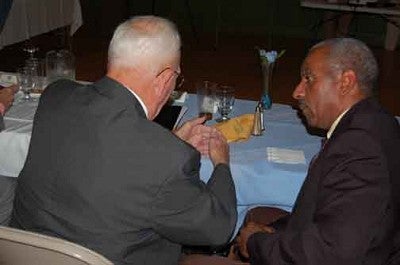PE School Board, Supervisors Look To Survey
Published 5:15 pm Tuesday, October 2, 2012
PRINCE EDWARD – County supervisors and school board members tackled school issues with the backdrop of the historic Moton Museum last Wednesday evening. The topic that has generated a concern for supervisors (they discussed school board performance in closed session in prior meetings), finally-with the aid of consultants-got an airing.
“I want to apologize to the School Board. I did not mean to upset the School Board by taking the Board of Supervisors into closed session,” cited Board of Supervisors Chairman William “Buckie” Fore near the marathon evening's end. “I thought it was the right thing to do. It has turned out in a very positive manner of which I am very proud.”
He would also note, “I don't think there's anybody mad here and I don't think there's any feelings hurt. I think we all realize that we've got a huge job before us that over time…we can do what we have set out to do.”
The “what,” at least initially, appears to be a survey of sorts and would encompass much of the Prince Edward community.
“It seems that the takeaway right now…is that there will be a commitment on the part of the respective administrative leadership and the leadership of the respective boards to look at bringing to bear the development of a sponsored survey that is developed by a professional organization that's in the business of doing such surveys and you would commit to organizing that and then…committing to administering the instrument in the immediate future,” summed up consultant Dr. Mike Chandler.
A byproduct of that, he continued, would then be used to lay the foundation for a community forum or a series of community meetings to have a conversation with the citizens of Prince Edward about what's working in public education, what they want for the future of public education and the things that they must work on today to make sure that the system is quality today and quality tomorrow.
“Does that make sense?” Dr. Chandler asked at the end of the long work session.
“And we both agree,” offered Fore, just before inviting School Board Chairman Russell Dove to high five.
Dove reciprocated.
The state of education has been a hot issue in recent months as County supervisors have met in closed door sessions to discuss the performance of the school board, taken their own survey, and asked the school board to do the same.
Last Wednesday's meeting was an opportunity for the two boards to break bread at the museum.
“Over the last few years our citizens have become increasingly concerned with the state of education in Prince Edward County,” Fore stated in his opening remarks. “I don't think that makes us unique, as I'm certain these same issues are being expressed in communities across Virginia and, yes, even across the nation. In years past, however, citizens only contacted the Board of Supervisors from time to time to share their concerns about education and issues that were related to the public school. But when our high school was identified as a turnaround school, which meant it was one of the low achievement schools in the state, (calls) regarding the quality of education at the high school intensified."
Fore further noted that he believes each of the board of supervisors members would agree that they have received an increasing number of calls about their school system.
“Of greater importance, our citizens are now asking that we, the Board of Supervisors, do something to address education in Prince Edward County,” Fore said.
Chairman Fore would cite that the board understands and respects the school board's statutory authority, but that “because we are the county's elected governing body, and because we support the school system with an annual appropriation of taxpayer dollars, the citizens of Prince Edward County rightfully hold the board of supervisors ultimately responsible for the outcomes that are generated in our public schools.”
He noted that the board has held two work sessions focused on public education and the role played by the board of supervisors and the appointed school board.
“Being that we are a deliberative body, the board felt it was necessary to discuss as a group the performance of the members of the School Board relative to their charge and the issues surrounding public education in Prince Edward County,” Fore said. “To this end, the board retained two facilitators to assist with this examination.”
He also highlighted surveys on the assessment of public education taken by the two boards.
“While our schools are not where we would like for them to be, the surveys indicate that we are moving in the right direction, and the Board of Supervisors wants to be a partner with the School Board and assist them with improving the quality of education in Prince Edward County.”
Fore would also note, “Our efforts to improve schools must be about the children currently in school and those who will be in school in the future. The past is important and Prince Edward County has had an educational history that is both a source of pride-achieving civil rights in education-and one that is less than stellar-the closing of the schools. I believe the past informs the present but it does not forecast the future.”
He would offer that the challenge of improving education must be focused on the future, not the past and that the education of their children is an investment in the future.
Dove thanked the Board of Supervisors for inviting the school board to participate in the joint session “for I am extremely confident that the greatest benefits are realized when individuals or groups talk with each other instead of at or about each other and I welcome any future opportunity for continued collaboration with you the board and, more importantly for the Prince Edward County community.”
Dr. Chandler, noted, “As you review your respective summaries, I think it is evident…that you are operating generally from the same sheet of music.”
He noted that they identified many of the same attributes and strengths, and assets that they associate with public education in the county, but also many of the same shortcomings.
Effective communication, Dove would note, is one of the areas identified during recent surveys conducted as part of their comprehensive long range planning process.
“In an effort to address that concern, we, the school community look forward to future opportunities to engage the entire community, by sharing not only what we believe are our challenges and our needs, but also as occasions to celebrate and share information about our strengths and our successes,” Dove said.
Dr. Chandler offered an extended opening on the survey and the work the two boards have done to date. Board members also raised issues and concerns as well as dealing with perceptions.
In addition to discussing the merits of a forum, the issues generally fell into one of several areas:
Instructional quality.
Accountability.
Discipline.
Planning for capital improvements and facilities maintenance issues.
Communication between the two boards.
Recognition of students.
Improving the image of schools.
Parental and community involvement.
“One of the problems that we identified was the public perception of the public school system and one of the things that comes to my mind…is what facts are presented to the public, what information are they working with to come to that conclusion,” School Board Member Dr. Ellery Sedgwick said. “Obviously…probably the most important driver of that, the state and federal criteria, which have labeled us a failing school.”
Dr. Sedgwick said he is interested in looking at those criteria and asking whether they define the school as a whole.
“I would begin by saying I think they are very important and very valid criteria. I think we have to focus on remedying the problems that they point out,” he said. “But, I don't think that they are the definition of our school and I begin that by saying…what does it mean to be a failing school? Well, it means that, in Prince Edward's case, something like 20 percent of our students fail to make a 400 grade on the standards of learning test.”
While Dr. Sedgwick would add that it is a tremendously important fact and is probably their first priority, he also adds that it “should not drive the whole public perception of our school system.” He noted that there are 80 percent of the students who are not represented in that and I want to know something about what kind of an education the other 80 percent of our students are getting and, in order to do that, we have to have criteria.”
While you have to look at multiple criteria, he noted the percentage of students scoring 500 and above is almost equal to those failing to make a 400.
Hampden District Supervisor Charles McKay said he liked the idea of sending out a survey to everybody and let them answer maybe ten questions from their personal experience, not from hearsay.
Farmville District (801) Supervisor Pattie Cooper-Jones assessed that they should start with the school system, noting that there are a lot of teachers who are not happy, don't feel like they are important, and feel like if they speak out they are going to be fired. The survey should be sent out allowing anonymous responses, she suggested.
Dr. Sedgwick highlighted that there is an exhaustive survey that is filled out every year and suggested that they should make more of the survey and really mine it and find out what the problems are and focus on the problems.
“I think we have a lot of information that we haven't used as effectively as we could,” he said.
One of the issues, Dr. Sedgwick cited, referencing the survey-particularly at the middle and high school-is the teacher's sense of inclusion in the disciplinary process; like they don't feel like they have much input and should have.
School Board member Darin Thomas cited low public attendance at their meetings, noting there's always positive things. He also cited supervisors aren't listening either, suggesting that it will help.
Still, it was noted, that there is a difference between the board meeting and the forum setting where there is a dialogue and elected and appointed officials are listening.
“…We're not against the forums,” Dove said. “Anything we can do to engage the community, but…you're not telling us nothing new. We've tried the forums, maybe it'll be different this time. We've tried them in different venues. We've been to the…Darlington Heights Fire Department, we've been to Prospect…We tried that, but we're willing to try it again.”
Leigh District Supervisor Don Gantt would offer there's things they can do to change image and perception, suggesting that they make the children dress better. Tightening up the dress code will help the image, which would help perception, he suggested.
Gantt would also cite that there are things going on that are “incredibly good,” noting Advanced Placement, that all three schools are accredited, and that it's going in the right direction.
“You get the perception out there it's going in the right direction and if you make a few big, bold moves, you'll see people turn up either to praise you for it or to say 'Hey, I don't like this change,' but they have to be bold moves and bold strides,” he said.
He added, however, that they have fixed a lot that needed to be fixed “no question about it.”
During the discussion there wasn't a unanimous thought on moving forward with the survey as the first step.
Gantt cited that they were elected to represent the community and the things that they've heard are the things that they've brought out and worked on.
“And what we came here tonight to do was to help you guys and help the county work through this thing from A to Z. But I would like to leave here with some direction, how to do it,” he said.
Dove suggested that the individual boards need to reach a consensus on issues and then meet again. He noted that they can't tackle all of it at one time.
Gantt would cite that what worried him was leaving there and they're still at a stalemate until they get back together. The worst decision is indecision, he said. Dove would respond that the worst decision sometimes can be the wrong decision if you don't take time to evaluate it.
County Administrator Wade Bartlett, however, cautioned that they don't know. “I've said this many times to my board members: How many people have you talked with? Thirty…which is a lot. Thirty times eight, 240. There's 13,000 registered voters in Prince Edward County, thereabouts. That's a small minority.”
Most people will not come out to a public forum, he further stated.
“…To me, it's very important to have a survey that is anonymous and get responses back,” Bartlett said. “Then, that way, you know what the people are thinking whether it's right or wrong. I'm not saying it's right, I'm just saying that's what they feel and then you know what to look at and what to work on.”
One consultant suggested that if they were committed to conducting a survey they should secure the services of an institution that is trusted by the community, who doesn't have a dog in the hunt and could do the survey-either by paper format, telephone-and would be charged with moving until they have a percentage of the population that would indicate some significance.
(Such a survey could include about 450-470 people and be conducted similar to those in elections. That, could be conducted in early 2013 and could cost upwards of $20,000, it was noted.)
“…I want to emphasize that the Board of Supervisors does not want to run the schools,” Fore said. “We don't want one part of running the schools. We want the School Board to run the school.”
He added, that they “…want to partner with the School Board to correct some of the things that the supervisors are hearing is wrong.”
Supervisors, he added, are hearing what the school board is not.
“That's what woke this thing up,” Fore said. He suggested that the best thing they can do is to attempt to get a very in-depth survey. Although he offered he didn't know whether it should come from the community or the parents of children in school, “but we need a professional organization to do it. We are not skilled in that kind of thing and we're gonna ask the wrong questions. And, so, from the partnership perspective, the Board of Supervisors can step up with the change to get that done. Once the survey is done and the information is assimilated, the School Board has got to develop policies to attack each one of these things.”
He would add they've got to prioritize problems perceived by the parents and come up with a policy that permeates not only the teachers and the supervisors of the teachers, but right on down through the student.
“And the only way we're going to do that is find out what's wrong and set priorities,” Fore said.
Dove said he would like to have someone outside of the community so it's really objective. If they get a comprehensive survey, he assessed, then you would find out whether the board is hearing from a small percentage.
“…I think after tonight we've got a starting point and we're just going to have to use our leadership to follow through. I do think the survey is a first step. I'd like to see us crank it out quickly and get the results back quickly,” Fore said.






